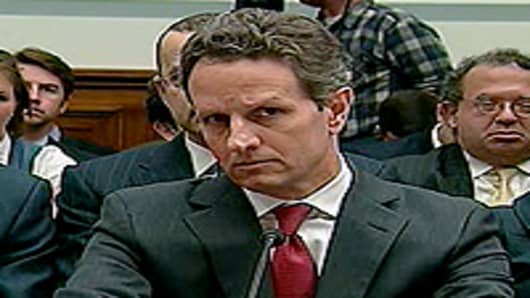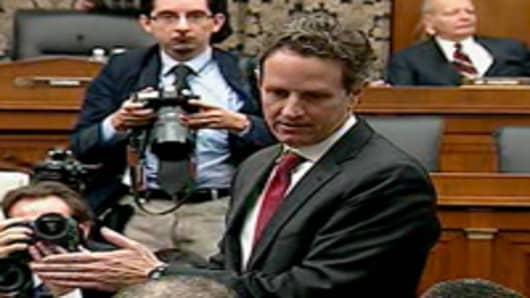"I withdrew from monetary policy decisions...and day to day management of the New York Fed," Geithner told a congressional panel. "I played no role in those decisions."
But his claims drew skepticism from members of the House Committee on Oversight and Government Reform.
"Many people, including people of this committee, have a hard time believing Secretary Geithner entered into an absolute cone of silence," said California Rep. Darrell Issa, the committee's top Republican.
"In a sharp exchange, Rep. John Mica, R-Fla., told Geithner "Either you were in charge and did the wrong thing or you participated in the wrong thing."
Recalling the early controversy over Geithner's failure to pay some personal income taxes, Mica said: "You gave lame excuses then, you are giving lame excuses now. Why shouldn't we ask for your resignation as secretary of the Treasury?"
"You have a right to your opinion," Geithner said.
Meanwhile, Federal Reserve Chairman Ben Bernanke—another target of recent criticism for his role, along with that of Geithner, in bank bailouts—said Wednesday he was "not directly involved in negotiations" involving payments from AIG to its business partners including Goldman Sachs and other Wall Street firms.
Those negotiations were handled primarily by the staff of the New York Fed, he said.
Bernanke also said the financial conditions of those so-called counterparties "was not a factor in the decision regarding the amount paid to the counterparties or whether concessions should be sought from them."
Bernanke made the comments in written responses to questions posed by Issa. The Fed chief's letter was handed out at Wednesday's hearing.
The Fed chief also said he wasn't involved in discussions with the Securities and Exchange Commission last year about any disclosure issues related to AIG.
When AIG went public and released the identities and payments made to its counterparties in March of 2009, Bernanke said he supported that decision.
Although Bernanke and Geithner have taken considerable criticism, the government's bank rescue effort began under former President George W. Bush and Henry Paulson, his Treasury secretary.
Paulson, also called to testify, was expected to reiterate earlier statements that he didn't know the details or participate in efforts to block disclosure.
Geithner said bold action was needed to get the nation's financial system out of the ditch.
"This was the gravest crisis we had seen since the Great Depression. It was not going to solve itself. Many people advocated we should let it burn itself out. But that would have been catastrophic for the economy. We're still living with the consequences of the damage and the wreckage," he said.



